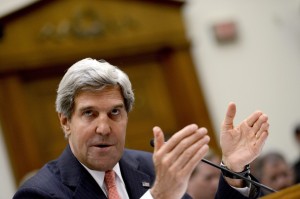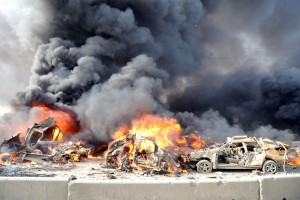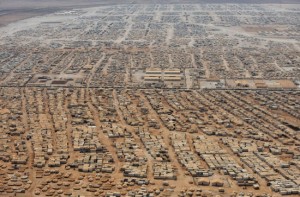
It was never going to happen, and everyone knew it.
Obviously the Government of Syria was not going to talk about putting a transitional body in its place. A legitimate government–one recognised by the UN – is not going to discuss such a thing, even if its actions are entirely wrong and the cause of its opponents entirely right. Such a precondition for negotiations was untenable, and the conference organisers knew this when they set it.
It could be argued that mere miscalculations on all sides created deadlock at the Geneva 2 talks and deepened the diplomatic and military quagmire. But what has happened is exactly as I said would happen, by design, in my previous article on this subject. If those attending with good intentions had read this journal they would have saved themselves a lot of trouble.
Where we are at
Following Geneva 2 the overall geopolitical stalemate remains. The US still wants Assad out, as he is Bad Dictator of the Month, in contrast to the many others with equally bad records it has actively supported – Marcos, Obiang, Mobutu, there is a long list.
The rest of the world knows that the US is using dubious methods to achieve this – arming the rebels with poison gas, staging attacks for the cameras and blaming them on the other side, prolonging the conflict by selling arms and giving false promises. Therefore there is ongoing resistance to letting the US have its way, as it could walk into their countries and do the same – it would be easy to support the Kurds and Armenians against the newly emerging powerhouse of Turkey, for example.
The US’ allies are making calculations as to how far they should be seen supporting such behaviour in exchange for any benefits they may gain. These calculations are changing daily. But the more failed talks there are, the longer the conflict goes on, the more the Syrian people themselves are blamed and the more chance there is of the country with the biggest guns getting its own way or creating an unwinnable conflict it can pull out of if it can’t. No prizes for guessing which country that is.
Why we are here

The Syrian conflict has created an insidious link between policymakers, special interests and so-called journalists, as I again explained in a previous article whose every word has so far proven true. All these parties are engaged in the business of manufacturing consent for US actions around the world, by any means possible, via the so-called “CNN effect.”
In many instances the US actions have gravely damaged the states it has entered, and not achieved the end results the US might be presumed to want – democracy, respect for human rights, etcetera. Ask the people who live there. Nevertheless, US foreign policy keeps soldiering on until it gets something right – the people being killed in the process regarded as acceptable collateral damage.
Consequently what is transpiring now has little to do with the Syrian people. The body count is nearing 140,000, and all sides act with impunity.
Whatever the rights and wrongs of the rebel cause, their agenda was hijacked long ago, and like many other revolutionary movements sponsored by the great powers over the decades those involved are not now fighting for anything they initially wanted, but for what suits their sponsors. These sponsors can change sides at any moment, and often have – Afghanistan from 1979 to the present day providing numerous examples.
The role of John Kerry
The man who devised and presided over the failed Geneva 2 talks is US Secretary of State John Kerry. In the days of the Vietnam War, he was a peacenik, despite serving with distinction in that conflict. Now he is in a position to do so he rattles sabres with the best of them. Is this a case of power corrupting? Or does John Kerry think that wars he sponsors are more moral than someone else’s?
Mr. Secretary of State, like his predecessors, wrongly assumed that if he said boo and kept repeating the rhetoric that “Mr. Assad must go that all will end well” everyone would eventually fall into line. However, as he well remembers, the US refused to remove Saddam Hussein during the first Gulf War, when he was Bad Dictator of the Month, because regime change was not allowed under international law or UN mandate.
The US is damaging its own cause by pursuing the line it is, as other countries do not see the difference between these two cases, It is therefore left with no choice but to try and achieve by force what it knows it cannot achieve by negotiation, as victory would provide its own justification. Everything we read in history books was written by winners, after all.
However at present, despite all its efforts, the US is not succeeding at that either. The Syrian government is gaining ground on the rebel forces, retaking the territories previously lost to the rebels, including some districts in Damascus, Homs and Aleppo.
Assad’s forces take orders from the man holding the levers of power; the rebels are obliged to wait for the latest consignments and stunts from sponsors using them for their own capricious purposes. Which side is better equipped to win this battle if it is confined to Syria alone?
The whole thing was a set-up
UN mediator Lakhdar Brahimi has shown he is well aware that Geneva 2 was destined to produce no result because the deck was stacked for failure beforehand. His final statement, at the end of the conference, said it all, “It’s not good for Syria that we come back for another round and fall into the same traps”.
He also went on to apologise for the lack of progress and that nothing had resulted from the Geneva peace talks, as if anyone really expected anything from the outset. Quite apart from the inherent implausibility of getting Assad to negotiate his own demise when he is winning the war, there is another problem.
Not enough countries want to go against the US but not enough support its actions in Syria either. So what else can they do but wave to the cameras to show their concern and agree nothing?
Pundits are claiming that “the only tangible success from Geneva has been easing up the clampdown on the besieged city of Homs enough for humanitarian assistance to filter in.” However it is not explained what this easing had to do with the talks. It is a trade-off, easing the blockade in exchange for not taking direct action. Did it need such a high-profile conference to achieve this?
Naturally the US, the UK and France are all pointing the finger at President Assad’s government for the failed talks, but it was they who made sure the talks would fail. It is merely posturing, not negotiation, to demand that a leader recognised as legitimate by the UN hands over power to a hodgepodge of opposition leaders led by a known criminal and terrorist, President of the National Coalition for Syrian Revolutionary and Opposition Forces Ahmad Jarba, who was not initially part of the conflict and has been imported for the purpose.
Terrorism is what is killing people
The government’s point man in the negotiations, Bashar al-Jaafari, put it bluntly. “Terrorism” – rebel violence – must be addressed first if the fighting is to stop. The War on Terror, used to justify any US action, is not being conducted in Syria because these are terrorists the US likes and arms. Al-Jaafari has a point.
At a recent audience with Jordan’s King Abdullah and other stakeholders in Syria and its region, US President Obama reportedly said: “There will be some intermediate steps that we can take in applying more pressure to the Assad regime and we are going to be continuing to work with all the parties concerned to try to move forward on a diplomatic solution.”
“Move forward on a diplomatic solution?”
Not if setting up Geneva 2 to fail is anything to go by. The positioning of the ‘and’ in Obama’s comment is significant: intermediate steps are one thing, diplomatic pressure something else.
So what are these unstated intermediate steps? Political assassinations are banned under international law. The only step can be using greater force against Assad and conducting black PR against his regime, regardless of the consequences.
What next?
As using force isn’t working, and the US will not negotiate about the rebels using it, the US faces a costly defeat very similar to that suffered in Vietnam when John Kerry was serving there. Such a military and diplomatic blunder would further erode US power at a time when it is being challenged by China, Russia and India, states which don’t do things the American way and make a success of not doing so.
There is a way to avoid this, but it is not a satisfactory one. The only chance for the opposition to change its military fortunes would be to merge the Syrian conflict into a protracted and costly regional war backed by Saudi Arabia, the Gulf monarchies, Turkey and the United States. This would draw more countries into providing direct support for one side or the other, as more interests would be threatened.
This is of course a time honoured practice. Amongst other examples, in 1739 Britain and Spain went to war in the West Indies, in the conflict later called “The War of Jenkins’ Ear”. With neither side gaining an advantage, they joined the War of Austrian Succession on opposite sides and settled their differences in the West Indies quietly, though with far greater loss of life.
The spectre of Middle East terrorism, whether “good” or “bad” from the perspective or the US or another power, has been part of international debate for a long time. Any number of wars can be started in the region at a moment’s notice, against or on behalf of any government. When enough US faces need to be saved, they will be.
The current stalemate makes this end game projection even more realistic, despite the fact it would be used to destroy the same regional governments which have for so long been the best friends and allies of the United States. Israel has much to fear from this process. So too do the American installed regimes in Iraq and Afghanistan, as exactly the same conflicts as in Syria, with the same underlying reasons, can be fought in their countries under the guise of the broader conflagration.
As George Orwell, the English essayist, novelist and satirist (1903–1950)described in his novel 1984:
“The war is not meant to be won, it is meant to be continuous. Hierarchical society is only possible on the basis of poverty and ignorance. This new version is the past and no different past can ever have existed. In principle the war effort is always planned to keep society on the brink of starvation. The war is waged by the ruling group against its own subjects and its object is not the victory over either Eurasia or East Asia, but to keep the very structure of society intact.”
Is this the world the rank and file combatants in Syria, who have legitimate grievances, are fighting for? They are finding out the hard way that it is –
those still alive to tell the tale.
Seth Ferris, investigative journalist and political scientist, expert on Middle Eastern affairs, exclusively for the online magazine “New Eastern Outlook”.

